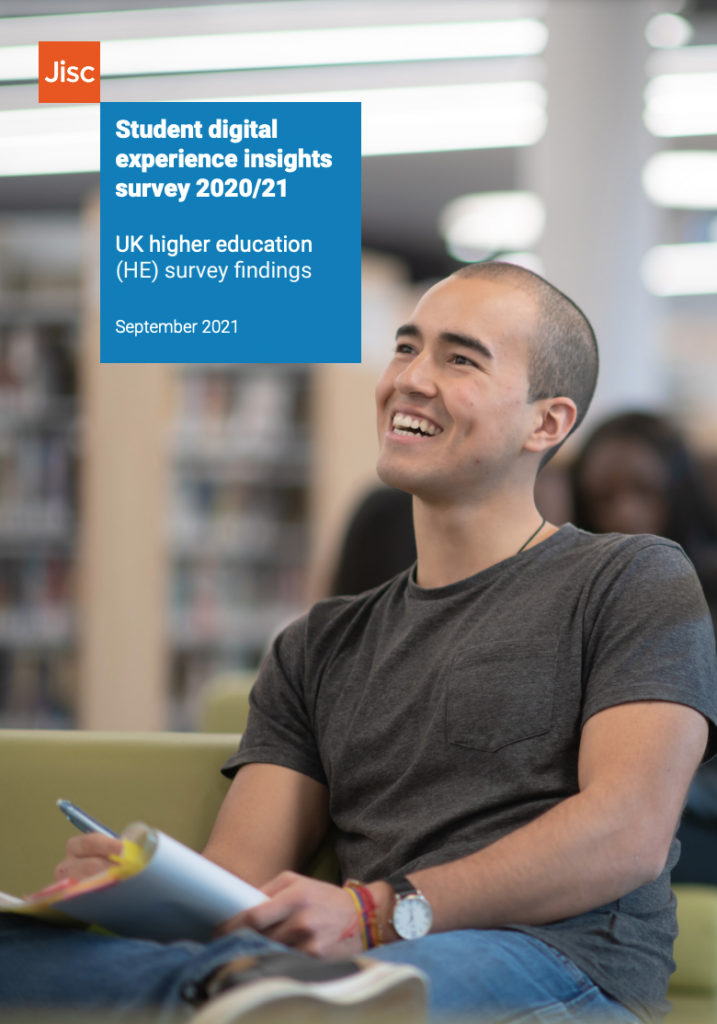Student Experiences of Digital Learning: JISC Report 2021

Digital learning has been an important topic of discussion and focus for years, and has increased in popularity, scope, and importance during the COVID pandemic and the surge of digital learning offered by K-12 schools as well as institutions of higher education. JISC Data Analytics UK recently published a timely report about student experiences of digital learning in 2020/21. This report includes findings from a survey conducted between October 2020 and April 2021with 38,917 participants from 41 different universities in the UK. Participant Ethnicities included: Black/African/Caribbean, Chinese/Japanese, Indian/Pakistani/Bangladeshi, White, Mixed Ethnicity, and Other. Participant age ranged from 16 to 30+ years old.
 The JISC report includes an executive summary of the results, as well as a detailed focus on four themes. The first theme is entitled You and Your Current Learning Situation. In this theme, JISC wanted to establish how students were leaning, which included their expectations of what their study experience would be like, the actual lived reality (type and location of learning) and whether they had experienced any problems. The survey results revealed that 37% of students expected their courses to be blended online/campus learning, 55% expected their courses to be fully on campus, and 8% expected their courses to be fully online. The reality was that 87% of courses were fully online, 12% were a mix of physically on site and online learning, and 1% of courses were physically on campus. Results showed that students experienced numerous problems when learning online, including poor wifi connection, difficulties with accessing online platform/services, mobile data costs, needing specialist software, not having a safe, private area to work, and not owning a suitable computer/device for online learning. 16% of students reported that they used at least one of four assistive technology, including screen readers (text to speech), dictation (speech to text), alternative input devices (eg switched) and screen magnification. Notably, only 40% of those who said they used assistive technologies were offered support to do so.
The JISC report includes an executive summary of the results, as well as a detailed focus on four themes. The first theme is entitled You and Your Current Learning Situation. In this theme, JISC wanted to establish how students were leaning, which included their expectations of what their study experience would be like, the actual lived reality (type and location of learning) and whether they had experienced any problems. The survey results revealed that 37% of students expected their courses to be blended online/campus learning, 55% expected their courses to be fully on campus, and 8% expected their courses to be fully online. The reality was that 87% of courses were fully online, 12% were a mix of physically on site and online learning, and 1% of courses were physically on campus. Results showed that students experienced numerous problems when learning online, including poor wifi connection, difficulties with accessing online platform/services, mobile data costs, needing specialist software, not having a safe, private area to work, and not owning a suitable computer/device for online learning. 16% of students reported that they used at least one of four assistive technology, including screen readers (text to speech), dictation (speech to text), alternative input devices (eg switched) and screen magnification. Notably, only 40% of those who said they used assistive technologies were offered support to do so.
The second theme is entitled Digital Platforms and Services at Your Organization. In this theme, JISC was looking at how well students felt their organization supported them with the technology they needed to access online learning, including the learning environment, the digital platforms, systems and services. They were also interested in how effectively the organization communicated with students, facilitated collaboration online, and to what extent organizations involved students in decision-making about online learning. The results found that 35% of students agreed that they were given the chance to be involved in decisions about online learning (36% neutral, 29% disagreed). In regards to the learning environment, 68% of students agreed that their learning environment was safe and secure, 47% agreed that it was reliable, 46% agreed that their learning environment was easy to navigate, and 41% agreed that it was well-designed. Additionally, 68% of students agreed that they were able to access online systems and services from anywhere, 60% agreed that their organization communicated effectively via online messaging, email, and notifications, 54% of students agreed that they were supported to use their own digital devices, and 46% agreed that their organization provided a good online environment for collaboration.
Theme Three is entitled Technology in Your Learning. This theme explored how technology had been used in learning, the range of learning activities students experienced, the quality of the materials used as well as the overall quality of online and digital learning. Students reported that they participated in a variety of learning activities, including live lecture/teaching sessions, recorded lecture/teaching sessions, online discussion with lecturers, interacting with quizzes/games/tests, working on group projects, online research tasks, and virtual lab, practical, or field work. 53% of students agreed that the quality of online learning materials were well-designed, 45% of students agreed that the online learning materials were at the right level and pace, and 35% of students agreed that the online learning materials were engaging and motivating. Additionally, overall, students were positive about the quality of online and digital learning in their courses. 67% of students rated it as ‘best imaginable, ‘excellent’ or ‘good.’
Theme Four is titled Your Digital Skills. This theme looked at the guidance and opportunities students were offered to develop their digital skills and whether they felt these were enough to help them achieve the learning expectations placed upon them. Students were positive about the support they received for online learning. 60% of students rated it as being either ‘best imaginable,’ ‘excellent’ or ‘good.’ 51% of students agreed that they had received support for learning online/away from campus, 41% agreed that they received guidance about the digital skills needed for their course, and 26% agreed that they had received an assessment of their digital skills and training needs. Additionally, 51% of students agreed that learning online made them feel safe in the context of the current pandemic situation, 49% of students agreed that they could access all the university support services they needed online, 42% agreed that the learning expectations placed on students had been reasonable, and 33% agreed that the concerns of students and their representatives were being heard.
Additional information available through the report includes information gathered from free text responses from students related to the most positive and most negative aspects of online learning, how they felt the quality of online and digital learning could be improved and one thing they felt their universities should do to help them learn effectively online. Information is included on how to get involved with JISC UK and additional resources for support from JISC UK. The information presented in this report provides valuable insight into students’ experiences with online learning. These insights can be helpful when instructors are planning and implementing online courses—during the pandemic and beyond. The full report can be accessed here: https://repository.jisc.ac.uk/8487/1/Student%20DEI%20HE%20report%202021%20Final.pdf
